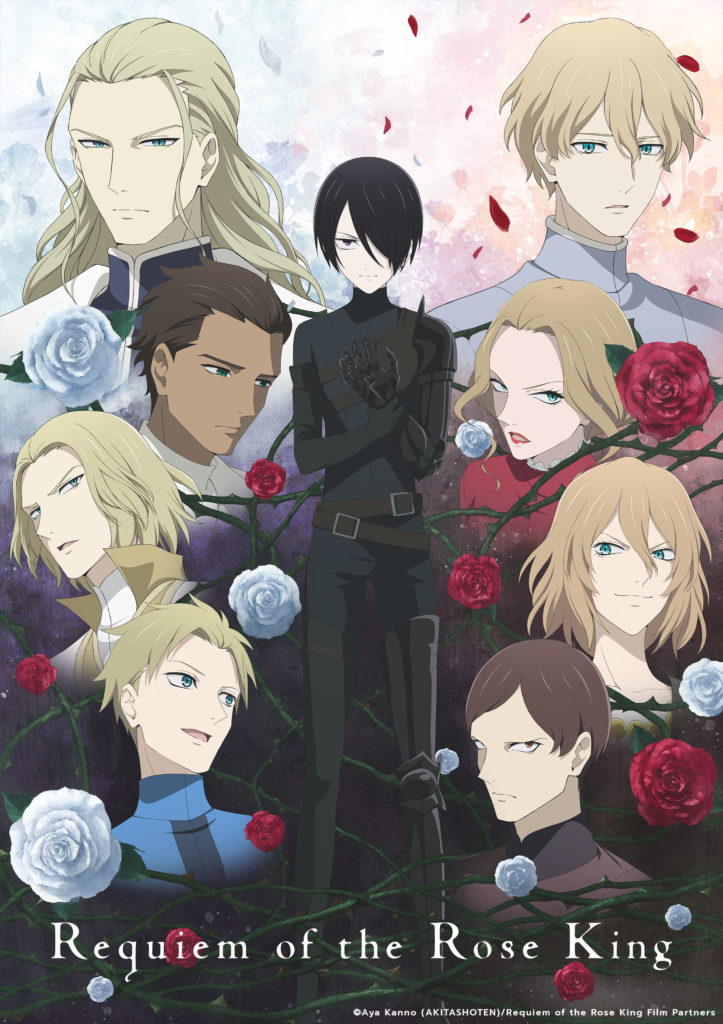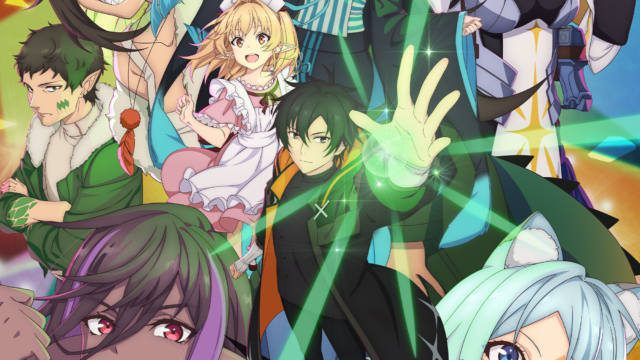English Dub Season Review: Requiem of the Rose King Season One
Overview (Spoilers Below):
As the Kingdom of England is torn between the House of York and the House of Lancaster—each claiming their leader to be the rightful king—young Richard III (Ciarán Strange), the intersex son of the Duke of York, is fighting a battle within himself. Despised by his mother, adored by his father, and alienated from most others, Richard grapples with frightful spirits haunting him, unsteady and unintentional alliances with his enemies, and his own passion for a throne.
Our Take:
Requiem of the Rose King is based on the Japanese manga series written and illustrated by Aya Kanno. Loosely based on the Shakespearean plays Henry VI, Part 3 and Richard III, the series is directed by Kentarō Suzuki and animated by studio J.C.Staff, with Hiroki Uchida writing the scripts. Tsutomu Hashizume designed the characters, while Kow Otani composed the music. The opening theme in the show’s first half is “Ware, Bara ni Hitasu” (I’m Obsessed with Roses) performed by Makoto Furukawa, and the ending theme is “Akumu” (Nightmare) performed by Zaq. For the second half, the opening theme is “Bara Rinbukyoku” (Rose Briar Rondo) performed by Makoto Furukawa, while the ending theme song is “Rasen” performed by Nowlu.
When it comes to Shakespeare, my knowledge is very few and far between. The only tale from the historical writer I have more experience with is Romeo and Juliet, a story about a doomed love amid the war between two feuding families. So when I read that this series is loosely based on some of Shakespeare’s other tragedies, mainly Richard III, I took this as an opportunity to expand my historical perspective on the famous writer.
The show’s first half depicts the Wars of the Roses period, with York confronting Lancaster for control over England. It explores the perspective of Richard III, who’s fighting to avenge the death of his father, the Duke of York (J. Michael Tatum). Richard is also at war with himself as he is born intersex, alienating most people around him, including his mother, Cecily Neville (Morgan Garrett). Additionally, Richard meets and falls in love with a shepherd, Henry VI (Landon McDonald), not knowing that he’s the head of the Lancaster family.
The second half of the season takes place many years after its twelfth episode, “Richard is Dead, Died Alone in the Woods That Day”. The final twelve episodes represent Richard’s quest to become the next Yorkist king of England. Unfortunately, his journey is constantly interrupted by the problems that lie ahead. One of them is that he’s stuck in a love triangle between his wife Anne (Emi Lo) and his trustworthy ally and new lover Buckingham (Meli Grant). It all concludes with the battle of Bosworth Field, with the Earl of Richmond (Brienne Olvera) leading Lancaster to battle Richard for the crown.
One significant aspect of Rose King that immediately caught my attention was the changes it made compared to the source material, mainly Richard III. In the play, the main character is depicted as an ugly hunchback. However, the anime redesigned Richard to be intersex who’s born with a female body. I’m pretty sure the reason for this change is to lure in modern audiences unfamiliar with the plays through its LGBT representation. If that’s the case, I happily welcome this risky change as the world of animation continues to display this type of representation through storytelling. More importantly, it was balanced well with the Shakespearean atmosphere that multiple fans would expect from the series.
It does take me a while to grow attached to the series due to a few confusing moments, including the characters having the same names as others. After that, it was smooth sailing for me, as the series became an emotionally compelling and stylish adaptation that Shakespeare would be proud of. As someone with a lack of experience with the author, I thought Requiem of the Rose King is simply fascinating in its technical aspect and brilliantly thought-provoking in its seasonal arc.
Aside from its convoluted elements, the other nitpick I had with the series is the draw distance for the characters. Whenever someone is far away during a specific scene, their face disappears, resulting in them resembling the iconic Slender Man. It happens in every episode, which can be distracting at first, but it’s nowhere near as off-putting as I feared.
Rose King is one of the shows that gradually improve in each episode regarding its character development and emotional depth. However, the only exception to this rule is its recap episode, “Part One Digest: Meetings and Partings”. While it’s necessary for those wanting to catch up with the series faster, it is also an unnecessary piece of filler designed to prolong the show’s second half. The season’s first half saw the show heading in that direction with its character introductions amid the Wars of the Roses period. While the first few episodes struggled a bit with their poignancy in the relationships, they’re still enthralling enough to bypass its minuscule shortcomings.
Fortunately, its second half is where the series shines for me. It took the qualities that worked in the first half and improved them for Richard’s journey to assume the throne. The final twelve episodes are consistently strong in their narrative and buildup, especially when considering Richard’s conflicts with his appearance and desires. The last two episodes, “Mother… Goodbye” and “Requiem of the Rose King”, are some of the best episodes I’ve seen in Rose King and one of the best finales in the anime department regarding its emotional conclusion and symbolism. These episodes bring everything full circle, with Richard coming to terms with himself and giving his love to others that deserve it, including Anne.
The characters were not only well-rounded and engaging, but they’re also successfully brought to life by its English dub voice cast. The highlight of the cast is Ciarán Strange, who recently voiced the young Ard Meteor in The Greatest Demon Lord Is Reborn as a Typical Nobody. Strange did a great job representing Richard’s complex personality and the conflict within himself through his riveting deliverance of the show’s dialogue. Another vocal performance I enjoyed the most comes from Ian Sinclair as Catesby, Richard’s servant. Sinclair brought plenty of effort to make his character a caring and selfless ally to Richard without falling prey to his formulaic personality.
While the faceless characters can be a minor nuisance for some viewers, they didn’t overshadow the show’s effort in displaying its animation. I’ve only seen some shows from J.C.Staff that delivered some decent visuals, like Food Wars! and The Executioner and Her Way of Life. Compared to those shows, I think Requiem of the Rose King has the best-looking animation I’ve seen from the studio. It’s bleakly vibrant in its environments and character designs and suitably gorgeous in its color palettes and silhouettes, especially in its symbolic imagery. Although it didn’t take advantage of its action scenes since most of them were just images of the carnage, the style flawlessly captures the authenticity and turmoil of 15th Century England and Shakespeare’s tragic tales.
Overall, Requiem of the Rose King is worthy enough to rule alongside some of the better anime in recent years. Like Richard, the series has some minor issues lying within that may alienate its subjects, including its animation errors involving the character’s faces. Luckily, they were quickly overshadowed by the show’s riveting narrative and sublime style. As a result, the anime adaptation is a royal crown fit for anime fans and Shakespearean followers. It’s hard to tell whether it’s enough to get me into reading more of Shakespeare, but I can say that watching the show made me appreciate the historic author even more.
























"There are also other characters that come and go (also owned by the Warner Bros. Discovery conglomerate media company)."
Huh. Is that just referring to other characters from the show itself, or is this implying that the new season is going to have cameos from other WBD IPs